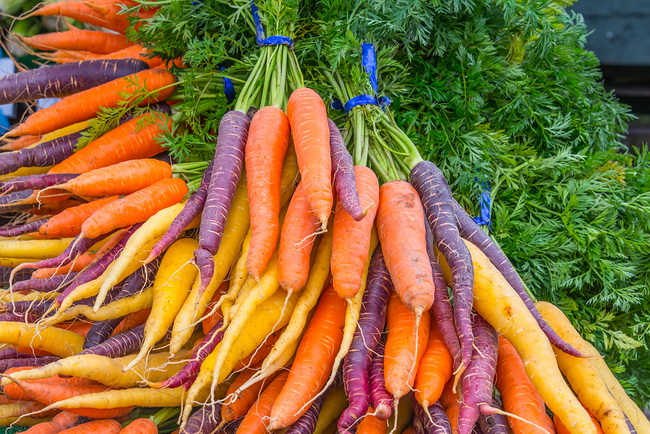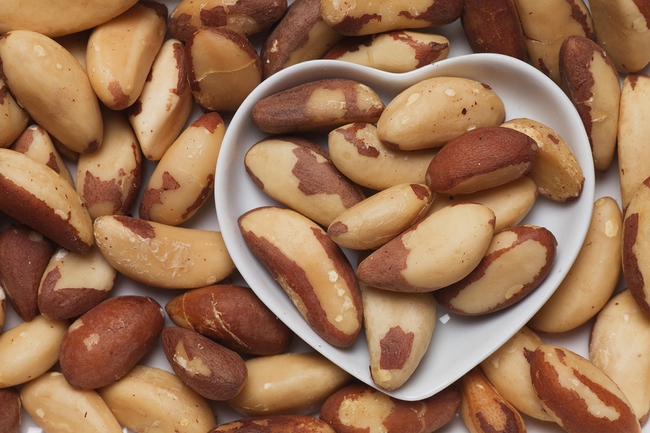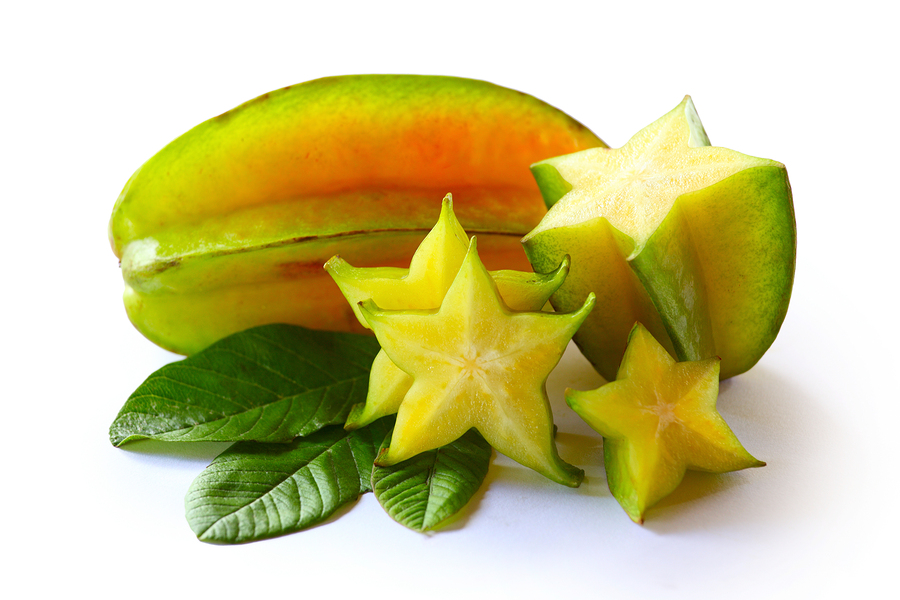- Make It Yourself Lavender Heart-Shaped Bath Bombs!
- 20 Things You Never Knew About “Down There”
- 12 Best Foods For Those Suffering From Arthritis Pain
- 12 Personal Hygiene Mistakes Almost Everyone Makes (Mom Never Told You About #4!)
- 15 Medicinal Plants And Herbs From The Cherokee People
- 12 Mind-Blowing Benefits Of Drinking Coconut Water During Pregnancy
- 12 Outstanding Winter Foods That Won’t Fatten You Up Like A Christmas Turkey
12 Mind Blowing Foods That Can Hurt You If You Eat Too Much
There are so many wonderful foods in this world, sometimes it’s hard to stop eating your favorites! However, there are plenty of good reasons to practice moderation in your life, one of them being that some foods can actually harm you if you eat too much!
It’s absolutely mind-blowing to imagine that simply eating too much of something can cause you bodily harm, but it’s true! Keep reading and find out if any of your favorites are on this list!
1. Star Fruit
Sometimes called carambola, these fruits aren’t common in the US, but they are found throughout South America and Southeast Asia. This little fruit is shaped just like a little star and they are often used in salads, juices, and simply eaten just as they are. Star fruit poisoning was first described back in the 1980’s, star fruit has a depressive effect on the central nervous system. Although this fruit poses very little harm for most people, there have been reports of acute kidney failure for those who have had a history of kidney disease. Common symptoms of intoxication include hiccups, vomiting, weakness, convulsions, and altered consciousness.
2. Fish Oils
Although omega-3 fatty acids are essential for a healthy body, they can be harmful. Since fish oils are a common supplement, it can easy to overdo it. Typical doses range between 1 to 6 grams each day but if you are considering taking between 13 grams or more each day, it can have serious blood thinning effects, even for healthy individuals. This can be very dangerous for those who are prone to bleeding or if you are taking blood thinning medications. Also, fish liver oil can also result in an overdose of vitamin A. This is a real concern for those who are pregnant or for young children. Never consume more fish and/or fish oil supplements that is recommended by your doctor.
3. Kombucha
This very trendy and popular fermented black tea is often made at home or purchased in many restaurants. It’s true that this symbiotic culture of yeast and bacteria ferments to make a healthy beverage, but there have been reported cases of severe toxic reactions to kombucha tea. The American Cancer Society has even put out warnings about some Kombucha starter cultures that have been shown to contain contaminants such as fungus and mold, which can cause illness. Centers for Disease Control state that kombucha tea that is consumed in normal quantities of 4 ounces is probably safe for healthy persons but for those with preexisting health conditions or for those who drink this tea to excess, it can cause problems. Be certain to buy your kombucha starter from a reputable source.
Continue to Page 2

Photo credit: bigstock.com
4. Tuna
Tuna, fresh and canned, is a very healthy food that is high in protein as well as a great source of healthy omega-3 fatty acids. Unfortunately, the sad news is that tuna can contain high levels of an environmental toxin called methylmercury. Methylmercury is a neurological toxin that can cause serious health problems including impaired hearing and speech problems, vision problems, lack of coordination, and developmental delays in children. Large tuna contain the most mercury, since it builds up over time. Many large tunas have been around for more than 40 years and have been eating smaller fish that also contain mercury. Limit your consumption of tuna to no more than two servings per week.
5. Carrots
Although Bugs Bunny might have been chewing on these all the time, carrots contain tons of beta-carotene, which is super healthy, but can cause problems if you eat too many. This condition is well-known and is called carotenemia. When you eat too many carrots, carotene builds up under the skin and accumulates in the fat cells. This will give skin a yellowish or orange hue to it, especially on the palms, knees, nose, and soles of the feet. Infants sometimes develop this when they are feed too many pureed carrots but adults can develop it as well. At least carotenemia is reversible once you stop eating carrots!
6. Cinnamon
This super delicious spice has been the subject of an internet game but it is also a very popular spice that is used in everything from baked goods to coffee. It does have strong medicinal properties that fight inflammation and lower blood sugar levels, as well being linked to a reduced risk of heart disease, diabetes, and cancer. But be sure not to overdo it! Cinnamon contains high levels of a compound called coumarin which, in large amounts, can cause liver toxicity and even cancer. Never consume more than 2 grams of cinnamon per day.
Continue to Page 3

Photo credit: bigstock.com
7. Brazil Nuts
Although Brazil nuts have many healthy qualities, including being a terrific source of selenium, however, selenium can be toxic in high amounts. The RDA for selenium is no more than 70 micrograms. One Brazil nut can have as much as 95 micrograms of selenium. Eating just 4 or 5 Brazil nuts, even small ones, can put you way over the safe limit. Selenium toxicity can cause loss of nails, hair, memory problems, and digestive problems. Limit yourself to just one or two tasty Brazil nuts each day.
8. Nutmeg
Like cinnamon, nutmeg is a tasty spice that is often used in baking, especially around the Christmas holidays. In small amounts, nutmeg can provide an interesting flavor to your foods but in larger doses, nutmeg causes myristicin poisoning. Symptoms of myristicin poisoning include nausea, dizziness, abdominal pain, heart arrhythmias, seizures, and hallucinations. Never eat more than 10 grams of nutmeg in one day.
SEE ALSO: Top 20 Superfoods and Spices for a Super Long Life
9. Cruciferous Veggies
Now you are probably wondering, how the heck can this be?! While it is true that these are some of the healthiest veggies on earth and are linked to a reduced risk of cancer and heart disease, but there are compounds in these vegetables that can interfere with your body’s ability to absorb iodine, which can cause hypothyroidism, which is an underactive thyroid. If you already have a thyroid condition, you should avoid consuming large quantities. Even for those who do not have thyroid issues, be sure that you are getting sufficient levels of iodine if you enjoy large quantities of veggies such as broccoli or cauliflower on a daily basis.
Continue to Page 4

Photo credit: bigstock.com
10. Coffee
Coffee itself isn’t really the problem. This beverage is loaded with healthy antioxidants and other compounds that have been linked to numerous health benefits. The problem is that when people consume too much coffee, they get too much caffeine. The average cup of coffee has between 80 and 120 mgs of caffeine. Up to 400 mgs of caffeine per day is considered to be safe. However, if you are a coffee fan, consuming more than 500 mgs of caffeine (about 5 or more cups of coffee per day) can overload the central nervous system causing stomach cramps, heart palpitations, irritability, insomnia, and muscle tremors. Although the amount of caffeine needed to cause these problems can vary greatly from person to person, you should know your limit. The minute you feel jittery or your hands begin to shake, you’ve had one too many.
11. Liver
Organs are some of the most nutritious parts of an animal, with the liver being king. However, just a 100 gram piece of beef liver can contain more than 7 times your recommended daily intake of copper and as much as 6 times the recommended daily intake of vitamin A. Vitamin A is a fat soluble vitamin and is stored in the fatty tissues of the body, making overdose easier than you might think. Vitamin A toxicity includes bone pain, nausea, vomiting, and vision problems. Copper toxicity can lead to neurodegenerative changes, even an increase in the risk of Alzheimer’s disease. No matter how much you love liver, keep your consumption to no more than twice per week.
12. Water
This is absolutely mind blowing, but it’s true; you really can drink too much water. Water intoxication, hyponatremia, is mostly a risk for endurance athletes. In fact, at the 2002 Boston Marathon, more than 488 runners, about 13 percent, were suffering from hyponatremia. Unfortunately, some internet “challenges” have encouraged dieters to drink more than a gallon of water per day as a means of “cleansing” the body. Drinking too much water dilutes the concentration of sodium in your blood, which creates a serious electrolyte imbalance. You can actually die from drinking too much water. Stick to the usual 8 to 10 glasses a day and you will be fine.
References:


































Marvin Zinn
Nov 30, 2015 at 12:54 pm
I really appreciate this real information as products were created instead of poison often added for flavor and sales. The medical system also saves lives, but most of the cause is from wrong food and activity. Also, the medical system (different in each country) often kills more than it saves. (If I believed doctors I would have been dead already four times. I know other options!)